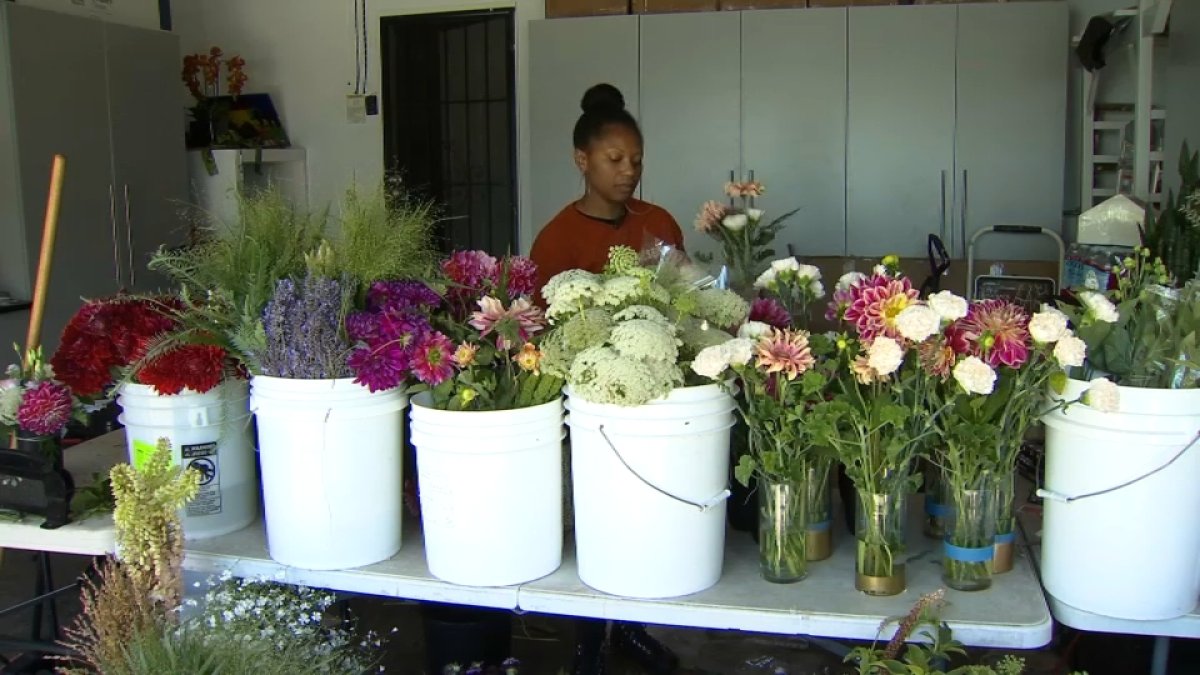
Most businesses are built from the ground up. It's fitting then, Ariana Marbley's career as a florist began with the soil, tending gardens alongside her grandfather in East Oakland.
"My love and appreciation for things that would grow out of the Earth," Marbley said. "I believe started there with him."
These days Marbley spins her magic with flowers in her Oakland garage, home base for her homegrown business Esscents of Flowers. After leaving a corporate gig at Chevron, she poured herself into her business -- expanding her clientele like the stretching petals of a flower.
And then the COVID-19 pandemic hit. The world froze. So did her business. Its brunt was immediate.
"Within one week all of my events were cancelled," she recalled.
But even sequestered at home with her husband and two young sons, the creativity seemed to be roiling inside her. She started clipping plants and flowers from the front yard, neighborhood beds and fields to assemble elaborate bouquets.
"I started to forage just to keep me sane and feeling connected and grounded," Marbley said, coaxing a bunch of dahlias into a vase.
Local
As she tried to figure out how to weather the storm of COVID-19, a second storm formed on the horizon with the death of George Floyd. Demonstrators filled the streets of the nation, fueled with a rage that Marbley knew well growing up in Oakland. As a Black woman, she clamored for a way to lend voice to the rising protests and drew on a resource she knew well -- flowers.
She got the idea to give out yellow roses to Black people, as a symbolic way to let them know they were being seen and heard. She enlisted volunteers to help her hand them out.
"So all over Oakland there were people distributing yellow roses to Black men, women and children," Marbley said, "and the response was absolutely amazing."
Her own business began to see the fruits of the new consciousness, as a wave of new customers sought out Black owned businesses to support. Orders came from people from corners she didn't even recognize.
Yet even among the new support, the old world still seemed to rear its ugly head. She applied for PPE loans aimed at supporting businesses through the pandemic, but never got a response.
It was the embodiment of recent federal studies that showed Black-owned businesses were less likely to qualify for pandemic loans than white businesses. The reasoning was that Black business owners were less likely to have relationships with the banks.
Marbley recalled when she first started her business and walked into a bank to apply for a $5,000 seed loan.
"I remember going to several different banks and each one getting turned down," she said. "To be quite honest I didn't think that I was going to get a lot of money going into a bank just being a Black woman."
On a recent day as Marbley worked through a table full of flower orders, her young sons Jalen and Landen popped in and out of the garage, bouncing between virtual classes and playing with the neighborhood kids. She cajoled them into sweeping up the floor full of clippings.
"I feel proud for my mom that she accomplished her goals in life," Jalen offered before running off.
Though the big weddings are on hold, Marbley is seeing business bloom again. She is busy making home deliveries and sells bouquets through a neighborhood cafe.
"We have good days and we have bad days," Marbley said from behind a wall of vases. "But I have to remain hopeful."